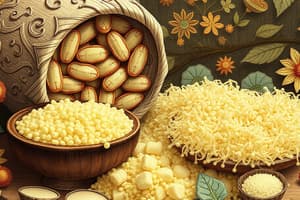Podcast
Questions and Answers
What is the primary role of carbohydrates in the body?
What is the primary role of carbohydrates in the body?
- To facilitate protein synthesis
- To help with muscle recovery
- To provide fuel and energy (correct)
- To serve as a source of hydration
What happens when glucose levels fall too low in the blood?
What happens when glucose levels fall too low in the blood?
- Increased hunger and alertness (correct)
- Reduced energy levels
- Enhanced cognitive function
- Decreased metabolism
Which of the following is classified as a simple carbohydrate?
Which of the following is classified as a simple carbohydrate?
- Glucose (correct)
- Oats
- Broccoli
- Potatoes
How do simple carbohydrates and complex carbohydrates differ in terms of cost and food association?
How do simple carbohydrates and complex carbohydrates differ in terms of cost and food association?
What percentage of the energy source in daily diets do simple carbohydrates comprise?
What percentage of the energy source in daily diets do simple carbohydrates comprise?
Flashcards
Carbohydrate's role in body
Carbohydrate's role in body
Carbohydrates provide energy to the body and are a key fuel source for blood and the nervous system.
Simple Carbohydrates
Simple Carbohydrates
Simple carbohydrates are sugars like glucose, fructose, and lactose found in foods like fruits, honey, and milk.
Complex Carbohydrates
Complex Carbohydrates
Complex carbohydrates are found in grains, vegetables, and starches. They are more complex structures than simple carbohydrates.
Normal Blood Sugar Range
Normal Blood Sugar Range
Signup and view all the flashcards
Carbohydrates Composition
Carbohydrates Composition
Signup and view all the flashcards
Study Notes
Carbohydrates
- Carbohydrates are the body's primary energy source, particularly for the brain and nervous system.
- They are composed of carbon, hydrogen, and oxygen.
- Carbohydrates are the most abundant dietary energy source, making up 50-70% of intake.
- Carbohydrates provide 4 kcal/g of energy.
Types of Carbohydrates
- Simple carbohydrates include naturally occurring sugars (glucose, fructose, sucrose, lactose) and added sugars (honey, corn syrup, sugar).
- Complex carbohydrates include starches (cereals, millets, pulses, root vegetables) and glycogen (animal foods). Cellulose in vegetables is resistant to digestion.
Importance of Carbohydrates
- Normal blood glucose levels are essential for well-being and energy.
- Low blood glucose levels lead to weakness and shakiness.
- High blood glucose levels cause sleepiness.
- Maintaining blood glucose levels requires conscious effort.
Alternative Energy Sources
- Fats and Proteins are also energy sources, but less efficient for the brain and nerves, as well as potentially associated with diseases.
Studying That Suits You
Use AI to generate personalized quizzes and flashcards to suit your learning preferences.




